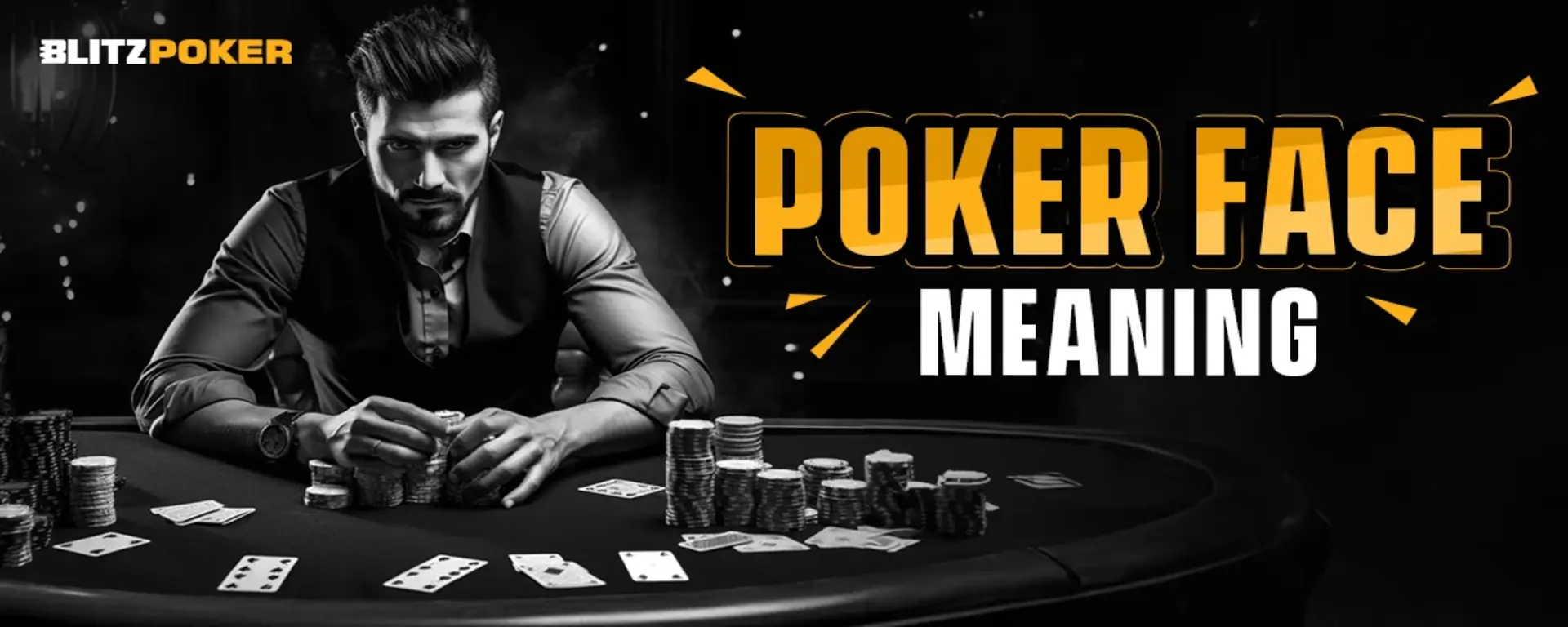Poker Face Meaning
A “poker face” refers to a facial expression that doesn’t reveal any emotion, especially in situations like playing poker where it’s essential not to show any clues about the cards you have or your thoughts and feelings. Essentially, it’s about maintaining a neutral expression to hide any signs of what you’re thinking or feeling. A poker face is like a mask for your emotions.
Origin of the Expression — Poker Face
The phrase “poker face expression” didn’t start within the game itself. Back in the 1920s, an American writer connected this term to a player who didn’t show any stress during the game. It’s been used since then for any poker player who stays calm and doesn’t reveal emotions, regardless of their card strength.
When you’re playing poker for money, it’s crucial to maintain a neutral poker face. Otherwise, even if you have a good hand, you might end up losing significantly. Surprisingly, a player with a weaker hand can make more profit by faking their expressions, while a player with a strong hand will often face losses.
Using a Poker Face in Poker Games
The purpose of a poker face is to show as little as possible through your actions and expressions. Here are some tips on “how to maintain a poker face”:
- Establish a routine. Consistency is key to keeping a poker face. Having a routine helps prevent unintentional signals.
- Decide on your sitting position. Whether cross-legged or sitting straight, choose a position that prevents involuntary reactions like flinching or smiling during the game.
- Allow yourself time to process while appearing bored. Avoid instantly showing excitement when receiving your cards to prevent your opponents from detecting any emotions.
- Adopt a consistent approach to glancing at your cards. Wait until it’s your turn to maintain consistency and preserve your poker face.
- Avoid touching your face or excessively fidgeting during the game. This prevents others from interpreting your actions as nervousness or habit.
- Maintain eye contact but focus on something dull and non-committal to sustain your poker face.
- Choose to remain silent or engage in light conversation, but ensure your poker face remains intact.
- Be consistent in your folding strategy. Whether silent or talking, fold with a composed expression, confusing your opponents.
- Consider how you contribute your chips. Whether randomly or neatly, maintain your poker face even if concerned about losing.
Consistency in actions, expressions, and reactions helps maintain a convincing poker face throughout the game.
Poker Face Usage
Now that you’ve understood the meaning of poker face, let’s get into its usage. Using a poker face in the game of poker is about maintaining a neutral expression regardless of the hand you’re dealt. It helps in concealing any emotions or hints about your cards from opponents. This way, you prevent others from guessing whether you have a strong hand or a weak one based on your reactions. It’s essentially a strategy to keep your game unpredictable and maintain an element of mystery.
Sentence Usages:
We hope that the Meaning of Poker Face is clear to you, know let’s understand how it’s used:
- In poker, a good poker face is your best ally, hiding your emotions and keeping your opponents guessing.
- In everyday life, maintaining a poker face might help in situations where you need to hide your emotions, like during a surprise party.
- The essence of a poker face lies in its ability to mask emotions, crucial in a game where observation matters.
- He’s amazing at keeping a poker face, revealing not even a little about what’s going on in his mind.
Is Poker Face A Skill?
Yes, having a poker face is considered a skill in the game of poker. It involves controlling your expressions and body language to avoid giving away any hints or emotions about your hand or intentions. Mastering a poker face requires practice and the ability to remain composed under pressure, making it a valuable skill in the game.
Importance of A Poker Face
Having a solid poker face extends beyond poker and applies to other casino games like Blackjack and Spanish 21. In these competitive settings, it’s crucial to maintain an advantage over others regardless of the cards you hold. A strong poker face helps you outwit opponents or the dealer by concealing your position in the game.
Beyond gaming, a good poker face offers various benefits. It showcases your ability to manage your emotions in any situation, reflecting a professional and composed demeanour. This skill portrays you as calm, collected, and trustworthy, enhancing your overall image in different scenarios.
Poker is a game where we don’t always see all the cards, just at certain times. To win money in a pot, we have to guess what cards our opponent has. We do this by looking at how they play, how much they bet, and any little clues they show with their actions.
Players accidentally show what they’re thinking through their body language. Sometimes it’s obvious, other times, it’s more subtle, like a small smile, looking away from the cards, or at the opponent. Some signs are hard to hide because they’re automatic body reactions. For instance, when someone has a good hand, their pupils might get bigger briefly because they’re excited about winning.
You can sometimes notice a player’s neck throbbing faster when they’re nervous. These are tough to hide, but you can try to cover them or control your game speed. Why keep a poker face? Why not act the same in every hand? Well, the thing is, when you have a strong or weak hand, you might act differently. Good opponents notice these changes. If you always keep the same poker face, it’s harder for others to figure out what you’re thinking.
